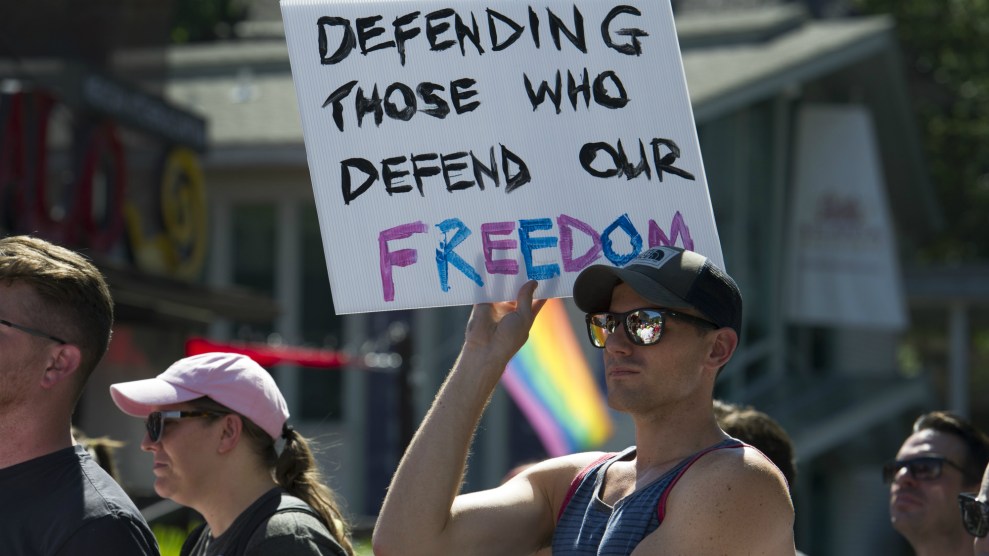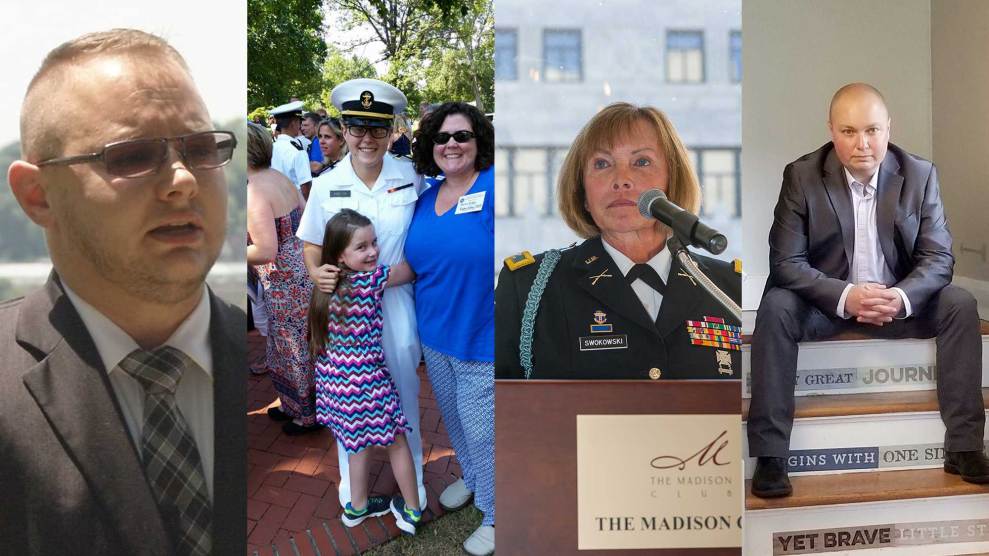
Jacob Eleazer, Regan Kibby, Sheri Swokowski, Blake DremannWDRB 41 Louisville News, National Center for Lesbian Rights, Brian Ebner/Optic Nerve, Courtesy of Blake Dremann
They’ve fought with the armed forces for centuries, but it wasn’t until last year that the Pentagon finally allowed transgender troops to serve openly. Then, in July, President Donald Trump tweeted that he would again ban them from the military. A federal judge temporarily blocked part of Trump’s policy, but the legal battle continues—leaving thousands of service members in limbo.
Sheri Swokowski, a 67-year-old Army colonel and the highest-ranking out transgender veteran in the country, was shocked when she read Trump’s tweets: “I couldn’t believe he would question our ability to serve when in fact we’ve been serving openly for over a year.” She’s retired now, but she worries about the impact of a ban on cadets and active-duty soldiers. “I often look back and wonder how much better an officer, not to mention human being, I might have been had I been allowed to transition while serving,” she says.
I talked with Swokowski, two younger service members, and a 20-year-old midshipman about what led them to the military, how coming out as transgender affected their careers, and what it has been like living in limbo. Here are their stories, in their own words:
Retired Army Colonel Sheri Swokowski: Highest-ranking out trans veteran in the United States
Years of service: 34
Age: 67
Based in Wisconsin
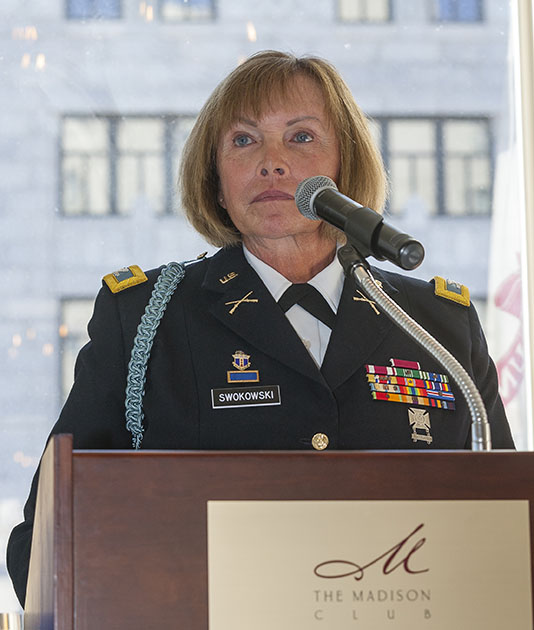
Sheri Swokowski
Brian Ebner/Optic Nerve
From an early age, probably five, I thought I should be wearing my sister’s clothes. At times when I found myself home alone, I did. But I grew up in a small town, blue collar and very conservative—I went to Catholic school and was an altar boy for six years—so it was always something I suppressed. When I was 25, I found out I wasn’t the only one who felt this way; there was publicity then about Renée Richards, a transgender female tennis player in New York. Still, it took me 50-plus years before I ever shared my secret.
I joined the military to serve, but also to follow my dad, who enlisted in 1944 and got to Europe just in time for the Battle of the Bulge. He was one of the lucky ones, captured as opposed to losing his life. On Easter Sunday in 1945, the Germans took him and the other American prisoners to a field and lined them up in front of a machine gun. It was just timing: The tanks from Patton’s 3rd Army came through the POW gates and they were liberated. He never talked about that experience. But you could tell he was proud, very proud, when I went to the Wisconsin military academy and earned a commission as a second lieutenant.
Because I worked full time for the National Guard, I knew being trans would get me discharged, so I suppressed it very deeply for three and a half decades. I’d have infrequent bouts of being authentic, buying clothing and wearing it for hours and then purging it when the guilt set in. Part of the Army values require you to put your organization and your soldiers’ welfare above your personal self, and that’s exactly what I did to be the best leader I could be at that time. One of my proudest moments was taking my unit overseas to Germany, and also leading in 1997 the largest reorganization of the Wisconsin Army National Guard since 1962.
After I retired from the military, when I was in my mid-50s, I was offered a job with a government contractor at the Force Management School as a lead instructor, so I moved to Washington while my wife stayed here, and that became my personal tipping point. I could live authentically out there, except when I was in the school house. Eventually I took several weeks off to transition. I went back as Sheri—I was extremely excited because it just felt wonderful to be completely authentic. When I walked into the director’s office, he thanked me for coming back, for helping with the course, and then said they’d already hired my replacement. I was a successful colonel with a 35-year career, and being let go like that was just devastating. The silver lining is that months later I was hired into the Pentagon as a civilian, and I spent two and a half years there at a fairly high level, post-transition, and nobody ever questioned me; it was an extremely positive experience in a place that most people think is extremely conservative.
When Trump announced his policy shift, I was shocked. I’m retired, but it upset me because of the young soldiers, sailors, airmen, and marines who had come out after the ban was lifted: The government said it had their back, and then the commander in chief pulled the rug out from underneath them. I couldn’t believe he would question our ability to serve when in fact we’ve been serving openly for over a year. Frankly, we’ve served in this country’s military since it was formed in the 1600s. We’ve just been doing our jobs better since the ban was lifted. Today I’m the highest-ranking out trans veteran in the United States, but I often look back and wonder how much better an officer, not to mention human being, I might have been had I been allowed to transition while serving.
Army Captain Jacob Eleazer: Doctoral candidate in counseling psychology
Years of service: 11
Age: 32
Based in Kentucky

Jacob Eleazer gives an interview to a local television station.
WDRB 41 Louisville News
I grew up in rural Kentucky and my dad was a priest, so it wasn’t until my mid-20s that I started understanding how gender was different from sexual orientation. I came out in 2013, before trans folks were allowed to openly serve. At that point, I’d been struggling with it for a while, trying to balance things: In uniform, it was “ma’am,” and then in my private civilian life I could be me. As a National Guard soldier, it seemed feasible—it was just one weekend a month and two weeks a year—but as I started taking testosterone, I ran into problems. One time I showed up in a suit and tie to a suicide prevention group where I volunteered, and at the end of the meeting they said other reps from the National Guard might come to the next meeting. I was like, “Oh shit. I just outed myself to all these people who might out me to folks at the National Guard.” I had to go around and ask everyone not to mention I had been at the meeting—it was really embarrassing.
If I was going to get outed, I wanted to do it with some dignity. I had just made captain, and I came out to my commander right before my promotion ceremony. She said it was no big deal, and everything was fine—until they pulled me out in the middle of field training one day. They started a mental health evaluation; if they diagnosed me with gender dysphoria, they could do an administrative separation for medical reasons. But I no longer met the diagnostic criteria, since I had already completed my physical transition. I sat down with the psychologist and said, “I’ve been teaching psychopathology and psycho-assessment at the graduate level, so if you misdiagnose me, that’s fine, but I’m going to know it.” I went through a lengthy process of fighting my discharge.
We had come to the end of that battle when the secretary of the Army put a halt on discharges based on gender identity, because they knew the Pentagon would be reviewing the policy. That was 2015, the same day my final separation order had been issued. So I was able to stay on, just by the skin of my teeth. When I saw Trump’s tweets in July, I honestly thought it was a hoax. In some ways it’s upsetting, disappointing, surprising, all those things, but we have a job to do and that has to be our primary focus. I hate to sound jaded, but after going through all that mess with them trying to discharge me, at this point I’m kind of like, “Well, here we go again.”
My dream is to become a military psychologist. I’ve had battle buddies who had committed suicide, folks who have had problems with addiction and PTSD, and I wanted to help. Unfortunately, transferring into the Army’s medical branch is considered a new commission. If trans people are permanently banned from enlisting or commissioning, I will not be allowed to serve as a military psychologist—even though I’m already a commissioned officer in the Army and will soon graduate with specialized training in treating trauma. It’s disappointing.
Navy Lt. Commander Blake Dremann: First openly trans service member to be promoted
Years of service: 11
Age: 36
Based in Washington, DC
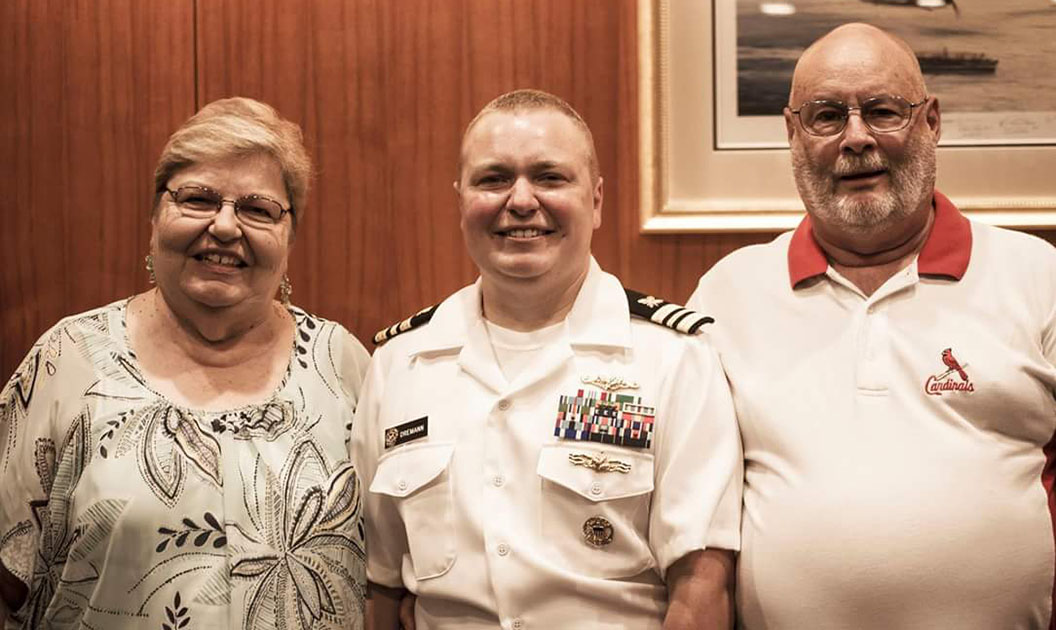
Blake Dremann with his parents at his promotion ceremony in 2016
Courtesy of Blake Dremann
I started to learn what “transgender” meant and how I identified with it in 2011 while I was in Afghanistan, basically running the commander’s emergency response program. I hid that part of my identity for several years, because around that time I was chosen to be one of the first females that integrated submarines—one of my proudest moments in the military—and so if I started figuring out how to transition to male, it could have embarrassed the Navy.
My grandmother was in the service, too—she did about 18 months in 1944 and 1945. She was an Army corporal, a truck driver in Europe, stationed in London and Paris. After the war ended, they told her they didn’t need her anymore, but she used to talk about being in the Army all the time—it was one of the highlights of her life. Her photo and the flag that draped her coffin are in my room today in a nice pretty case. I joined the military partly because I wanted to contribute to the fight.
I didn’t come out until 2015, when I was in DC. I had started taking hormones on the submarine, and I had pretty much socially transitioned as far as friends and family, but I definitely wasn’t out at work. I had been at the Pentagon for all of three days when a lieutenant colonel came up to me and was like, “Hey, do you go by another name outside of work?” So, you have that choice right then and there to lie or not lie, and I chose not to. She was supportive, knowing they were getting ready to review the policy, and my work decided they were cool with calling me Blake. My commander, he did the right thing versus doing things the right way.
Today I’m the president of SPART*A, an LGBT military group. Before the Pentagon lifted the ban on transgender service members, I went with several service members to meet former Defense Secretary Ash Carter. It was surreal: As a semi-mid-grade junior officer, you don’t think about getting ready to meet the secretary of defense. It was exciting to tell our stories and show that we’re high performers, and that a gender transition just means we can concentrate on that even more. In 2015, I had been presented with an award for junior supply officers—they pick three to five a year as basically the top supply officers in the Navy. That was another proud moment.
Not a whole lot changed for me after they lifted the ban because they were already calling me by my preferred name, and unless it was an official event, anytime I was required to be in my service uniform I was already in my male uniform. In 2016, I was the first openly transgender service member to be promoted. I heard about Trump’s tweets on CNN while I was at work—I had to go find my boss and leave, mainly because as president of the organization I was going to have to be a calming voice to the service members and in the media. It definitely gets exhausting sometimes: I work full time and I’m also enrolled in a master’s program. But it’s what needs to be done. I have to have the master’s degree to continue in my career, and we have to keep fighting for people to understand what trans service means. So, that’s what we do.
Midshipman Regan Kibby: One of the first plaintiffs to sue the Trump administration over the ban
Years at the Naval Academy: 2
Age: 20
Based in North Carolina
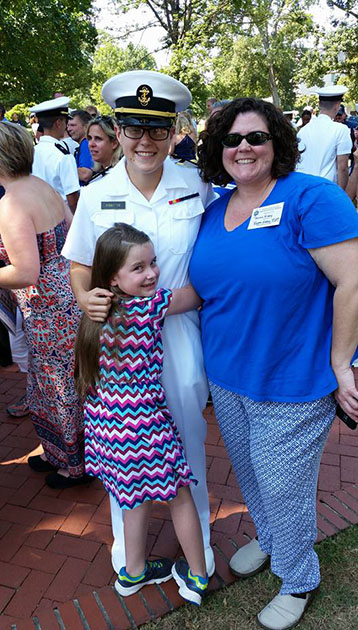
Regan Kibby with his mom and sister
Courtesy of the National Center for Lesbian Rights
My earliest memories are from growing up in San Diego and just being surrounded by the military. Seeing ships and uniformed sailors everywhere I turned. I think that, along with my dad’s stories and pictures of his time in the Navy, planted the idea of service in my mind from a very young age, and I was really motivated: Through middle school and high school, I participated in everything I could, played several sports every year, took all the advanced courses that my school offered, and never made less than an A in any class. I poured hours and hours of my life into junior ROTC. I was committed to serving my country as soon as I was old enough to do it.
One of my proudest moments was the first day of plebe summer, before the freshman class goes through boot camp at the Naval Academy. It’s a really chaotic day, really stressful. But at the end of it, we gather and give the oath of office, and we all shout together at the top of our lungs, “I do,” and it echoes everywhere and the crowd cheers. That was a big moment. Everything I had worked for was paying off. Here I was, swearing in as a midshipman in the United States Navy.
A couple of weeks later, Secretary Carter announced that trans people could no longer be kicked out of the military simply for being trans, and it was like a spark went off in my mind. I started being more honest with myself, and after a fair bit of introspection I came out as transgender. I talked to my friends and my roommates, who were all supportive. We still didn’t have a policy on how the military would allow transitions, but my chain of command were supportive, too: They said they would treat me with respect, make sure everyone else treated me with respect, and that when a policy did come out they would help me navigate it to the best of their ability.
After the initial shock of Trump’s tweets wore off, I was angry, sad, and a bit scared. It was like everything I had worked for was being taken away. For a while I felt powerless to do anything about it, but then I heard about a lawsuit and thought it might be a way to fight back, instead of just waiting for my future to be decided for me. I’m really grateful for that opportunity. Still, I’m in limbo. If Trump’s policy isn’t stopped, I won’t be able to go back to the academy and graduate. So, my message to anyone who opposes trans military service is that we are no different from any other service member. We wake up, put on the uniform, and do our jobs just as well as everyone else. We have shown time and again that we are willing and able to serve. And in a country where so many people are able to serve but choose not to, I think that means a lot.
These stories have been edited for length and clarity.

